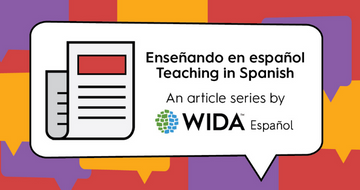Reflection: COVID-19 effects on our bi/multilingual students

During the initial shock and confusion at the start of the pandemic over two years ago, my son’s school was working hard to ensure students had access to meals, devices, a stable internet connection, and supplies. Different stakeholders were asking different questions. There was concern about the health and emotional well-being of students and families, concern about how — and how long — the system could support a meaningful online education, and the impact the changes and uncertainty would cause in academic growth. Since then, we have seen how some things worked for our bi/multilingual students and how some things simply did not — or inadvertently exposed some areas of weakness.
One thing I noticed right from the start, were shifts in my child’s bilingual instruction. Lessons, materials, and assignments drifted from a somewhat even use of Spanish and English to minimal use of Spanish. Teachers also struggled to access and share quality bilingual materials, so there was an eventual default to English. It was as if his bilingual program was absorbed without a proper farewell. Sadly, he was not in a unique situation. I also heard from other parents and caregivers of children of color about how quickly bilingual practices and dual language mission and vision goals were adjusted, changed, revised, and overall struggled to survive.
A 2021 report from the United States Department of Education, Office of Civil Rights, noted that schools had to face the reality of “insufficient numbers of appropriately equipped teachers and other staff.” For those that serve bi/multilingual students, this is a fact that unlikely comes as a surprise. As a result of this pandemic, we need to make time to reflect and reevaluate. If, collectively, we believe education is a stimulant for social justice, serving children of color through bilingual and dual language programs, even in our most fragile state, should not be a question of if, but a matter of commitment to the best education we can provide.
Our new reality also brought to light successes for bilingualism and beyond. For example, students were able to develop skills that they otherwise may not have had the chance to strengthen. Students, parents, and teachers across the nation were learning how to navigate multiple platforms and their respective functionalities, highlighting the role of empathy in the learning process. Platforms with two-way bi/multilingual features continued to help facilitate communication during the peak of the pandemic. Students, parents, and teachers also explored the use of synchronous and asynchronous learning opportunities that leveraged a more authentic home and school connection. For example, teachers and parents were able to communicate during lessons to clarify expectations or facilitate parents serving as guests and language role models for read alouds or other leaning activities.
Threaded in this was a genuine look into the other side. Parents were able to get a glimpse and an ear into the instruction of their students across both languages. Teachers were able to get a better understanding of the linguistic, cultural, and social-emotional, and experiential assets in the home. Teachers also had a genuine window into the life challenges present in a home with sometimes multiple family members trying to learn, work, and live — a reality some teachers were living, too.
With our collective lessons learned and celebrations of what went well, this is our chance to live in a world where bi/multilingual students, communities, and programs cannot only survive but also thrive. We need spaces where bi/multilingual, multicultural identities are not dependent on special circumstances, waves of approval from external audiences, or mandates, but that exist and flourish because we do right by our children for a better future. When it matters, our actions must reflect our words. Otherwise, they’re just words y las palabras se las lleva el viento.
About the author
Analleli Muñoz is an assistant director of professional learning at WIDA focused on strengthening the development and delivery of WIDA Español professional learning offerings and resources to support educators serving emergent bilinguals.
To stay informed about WIDA Español resources, tools and services use the News Signup form to manage email preferences and select WIDA Español as an interest area.





